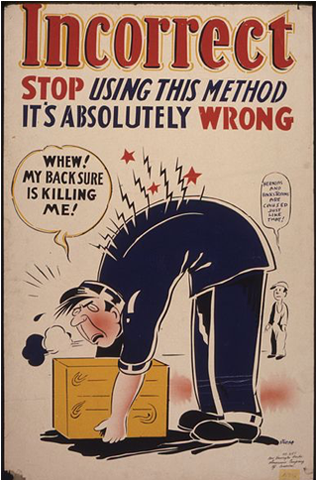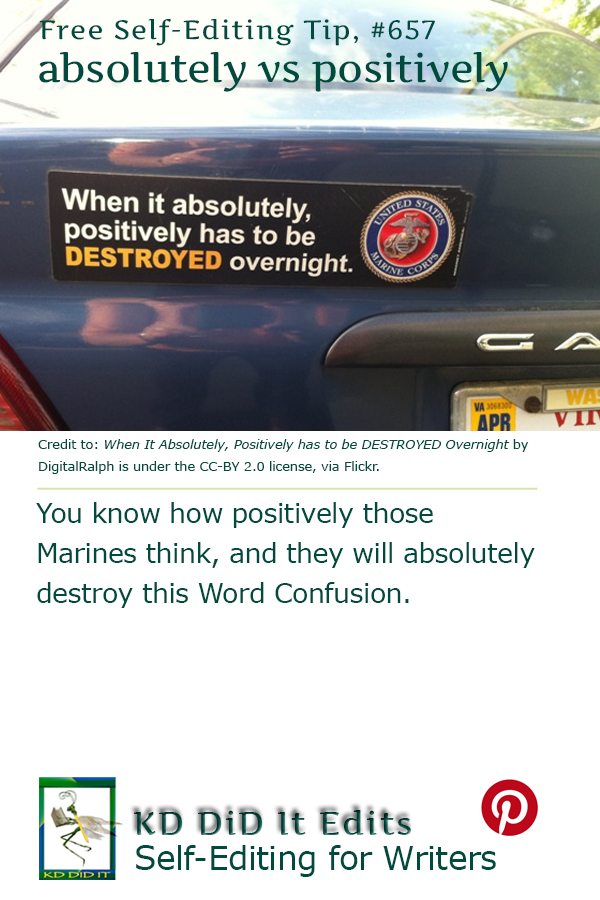When it absolutely, positively has to be there on time.
Essentially, both words are used in the same way, to emphasize a situation. It’s in the essential specifics, that the distinction appears: no limitations versus one limitation.
Absolutely isn’t concerned with qualifications or facts. Nor does it have any limitations — until one gets to the mathematics of it, then it completely reverses itself.
Positively does have a limitation in that it does concern itself with qualifying the statement. It must be a certainty.
Word Confusions . . .
. . . started as my way of dealing with a professional frustration with properly spelled words that were out of context in manuscripts I was editing as well as books I was reviewing. It evolved into a sharing of information with y’all. I’m hoping you’ll share with us words that have been a bête noire for you from either end.
If you found this post on “Absolutely versus Positively” interesting, consider subscribing to KD Did It, if you’d like to track this post for future updates.
| Absolutely | Positively |
|---|---|
 |
 |
| Part of Grammar: | |
| Adverb; Exclamation | Adverb; Exclamation |
| Adverb: With no qualification, restriction, or limitation
Independently
[Grammar; of a verb] Without a stated object [Mathematics] With respect to absolute values Exclamation: |
Adverb: In a positive way, especially by expressing optimism, agreement, or acceptance
Used to emphasize that something is the case, even though it may seem surprising Exclamation: |
| Examples: | |
| Adverb: She trusted him absolutely. You’re absolutely right. He absolutely adores that car. Dad was absolutely furious. It’s absolutely pouring out there. The food was absolutely disgusting! She had absolutely no idea what he was talking about. “Did they give you a free hand when you joined the band?” “Absolutely!” White-collar crime increased both absolutely and in comparison with other categories. No, it’s an absolutely convergent series. Exclamation: Do you think it will work? Absolutely! “Do you think he’s right?” “Absolutely not!” |
Adverb: The negotiations started positively, with agreement on several issues. It’s time I got down to thinking positively about this show. Only three drivers tested positively for excess alcohol following accidents in the area. Experts could not positively identify the voices. This is positively the last word on the matter. Some of the diets may be positively dangerous. He positively hated her. That man is positively horrid. Exclamation: Do you think it will work? Positively! “Do you think he’s right?” “Positively not!” |
| Derivatives: | |
| Adjective: absolute Noun: absolute, absoluteness |
Adjective: positive Noun: positive, positiveness |
| History of the Word: | |
| It was first recorded in 1525-35 as absolute + -ly.
The base word is from the late Middle English, from the Latin absolutus meaning freed, unrestricted, and is past participle of absolvere. |
It was first recorded in 1585-95 as positive + -ly.
The base word is from the late Middle English, from the Old French positif, -ive or the Latin positivus, which is from posit- meaning placed, from the verb ponere. The original sense referred to laws as being formally laid down, which gave rise to the sense explicitly laid down and admitting no question, hence certain. |
C’mon, get it out of your system, bitch, whine, moan . . . which words are your pet peeves? Also, please note that I try to be as accurate as I can, but mistakes happen or I miss something. Email me if you find errors, so I can fix them . . . and we’ll all benefit!
Satisfy your curiosity about other Word Confusions on its homepage or more generally explore the index of self-editing posts. You may also want to explore Book Layout & Formatting Ideas, Formatting Tips, Grammar Explanations, Linguistics, Publishing Tips, the Properly Punctuated, Writing Ideas and Resources, and Working Your Website.
Resources for Absolutely versus Positively
Some of these links may be affiliate links, and I will earn a small percentage, if you should buy it. It does not affect the price you pay.
Apple Dictionary.com
Dictionary.com: absolutely, positively
Merriam-Webster: absolutely
Pinterest Photo Credits:
When It Absolutely, Positively has to be DESTROYED Overnight, <https://www.flickr.com/photos/ralphpaglia/6011991058>, by DigitalRalph, <https://www.flickr.com/photos/ralphpaglia/>, is under the CC-BY 2.0 license, via Flickr.
Revised as of 25 Nov 2024
By: Kathy Davie
Some of these links may be affiliate links, and I will earn a small percentage, if you should buy it. It does not affect the price you pay.

